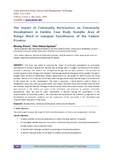Abstract:
This study was aimed at assessing the impact of community participation on community Development in Zambia in general and Nsanjika area of Nsingo ward in Luangeni constituency of the Eastern province in particular. The research was prompted by the gap that has been prevalent in the provision of services by government; this gap exists between ‘what people need and what government provides. This gap is
brought about by lack of collaboration between government and the people for which services are being provided, the aim of this study was to find ways which this gap can be closed and the impact the involvement of the people has on their development. The study is grounded in David Easton’s systems theory. A triangulation inquiry was used and questionnaires and in-depth interviews were used to collect data. The data was analysed using the Statistical Package for Social Sciences (SPSS) and content analysis. The study revealed that inasmuch as the citizens are aware of the institutions and structures to promote community development, there was lack of citizen involvement in decision making and participation in the implementation of community projects. The study therefore recommends the a bottom up approach to the identification of community problems and the involvement of the community in the formulation and implementation of projects in their areas.
